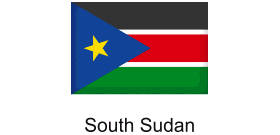 South Sudan's Bold Move: New Transport Policy Set to Revitalize Regional Tourism
South Sudan's Bold Move: New Transport Policy Set to Revitalize Regional Tourism
In a significant development poised to reshape the travel landscape, South Sudan has unveiled a new transport policy aimed at overhauling its infrastructure and boosting regional tourism. This strategic initiative promises to enhance connectivity and create a more accessible and appealing destination for travelers across Africa and beyond.
Historically, South Sudan's transport infrastructure has grappled with numerous challenges, primarily due to prolonged conflicts and underinvestment. The country's road networks are sparse, with a mere 2% being paved, and most become impassable during the rainy season. The railway system is limited, and air travel, though slightly better developed, still suffers from inadequate facilities and infrequent connections. These conditions have significantly hindered the growth of tourism, a sector with tremendous potential to contribute to the nation's economy.
The new policy introduces comprehensive upgrades across all modes of transport. Key projects include the expansion of the road network with more paved roads to facilitate smoother travel throughout the year. The railway system is set to receive a much-needed boost, enhancing links within South Sudan and with neighboring countries. Perhaps most crucially, the policy focuses on improving air travel infrastructure. Upgrades to major airports, including Juba International Airport, and the development of regional airstrips are expected to increase both domestic and international flight frequencies.
The impact of these improvements on regional tourism could be transformative. By making tourist destinations more accessible, South Sudan aims to attract a greater number of visitors, eager to explore its rich cultural heritage and natural beauty. Enhanced transport links will also facilitate easier movement for tourists within the country, potentially increasing the length and quality of their stays.
For African travel agents, this represents a golden opportunity to expand their offerings. The opening up of South Sudan as a viable tourist destination allows for the creation of new travel packages that include safaris, cultural tours, and eco-tourism adventures. Moreover, improved safety and infrastructure are likely to reassure potential travelers, making it a more attractive option for international tourists.
The broader implications for the travel industry are equally promising. Better transport facilities will likely lead to increased business travel and the possibility of new commercial ventures in the region. This, in turn, could spur further economic development, creating jobs and boosting local businesses that cater to tourists.
As South Sudan embarks on this ambitious journey to revitalize its transport infrastructure, the ripple effects could be felt far beyond its borders, enhancing its connectivity with the rest of Africa. For travel professionals, staying informed about these developments and ready to adapt to the evolving landscape will be key to capitalizing on the emerging opportunities in this dynamic region.
With strategic planning and innovative marketing, travel agents can play a pivotal role in promoting South Sudan's renewed appeal, helping to shape the future of tourism in the region. As the country opens its doors wider to the world, the prospects for growth in travel and tourism look brighter than ever, promising a new chapter of accessibility and exploration in one of Africa's most intriguing destinations.
